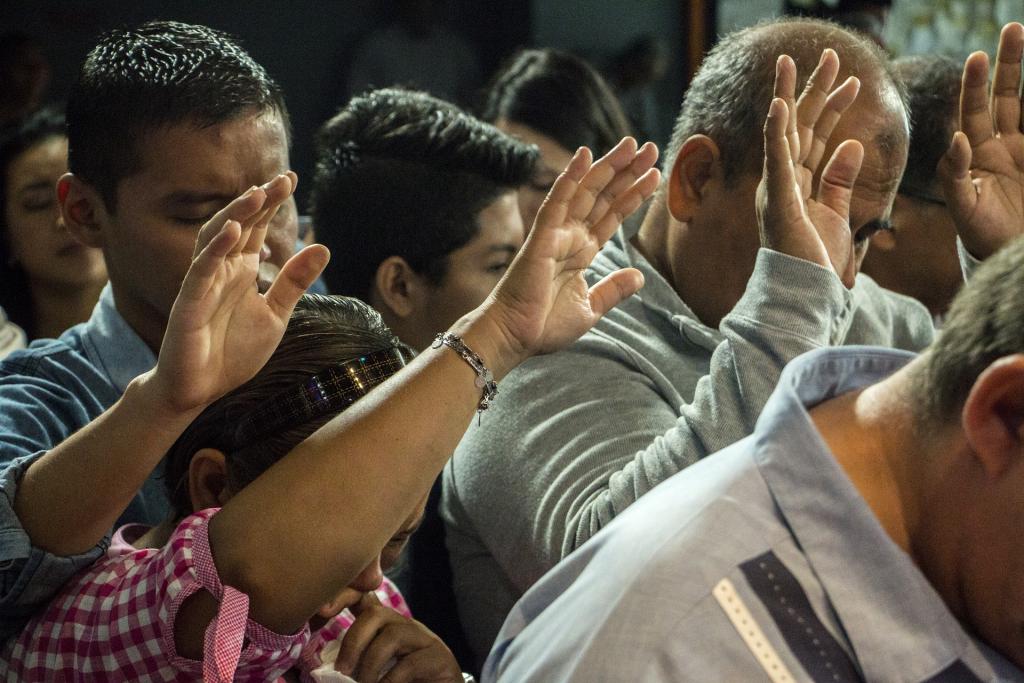
As a Catholic blogger, I often receive comments from people who may not agree with Catholic doctrine or view Catholicism in a positive light. One of the most harsh criticisms I receive from fundamentalist Protestant Christians is that I’m a part of the largest cult in the history of the world. This is often paired with a plea to ‘return to Christ and leave the church of Rome.‘
I think, for the most part, these people are sincere in their believe in Christ and are well-meaning in their concern for others who might be trapped in a possibly toxic community focused on asphyxiating control over their members. But I would also assert that their use of the word ‘cult‘ comes from a weaponized misunderstanding of what it actually means.
Dictionary definition of a ‘cult’ as found on Google:
cult
-
a relatively small group of people having religious beliefs or practices regarded by others as strange or sinister.“a network of Satan-worshiping cults”Synonyms:
-
a misplaced or excessive admiration for a particular person or thing.“a cult of personality surrounding the leaders”
It is worth adding that artists, musicians, bands, films, actors, sports teams and athletes can also be said to have a cult-following. When someone defines a rock album or an indie film as a ‘cult classic,’ it is usually implied with positive connotations. If anything, it crowns them to be something or someone worth following. But based on the dictionary definition, is it a fair assessment that Christianity can be defined as a form of cult. The ancient Jews most definitely viewed the early Christians as a radical movement that deviated from Hebrew tradition. Many had believed that reverence for Jesus Christ as the Son of God was also a misplaced and excessive form of admiration, which would seemingly fit the dictionary description of a cult. Though a point addressed by St. Paul puts into perspective whether Christianity is worth following…
“But if there is no resurrection of the dead, then Christ has not been raised; if Christ has not been raised, then our preaching is in vain and your faith is in vain. We are even found to be misrepresenting God, because we testified of God that he raised Christ, whom he did not raise if it is true that the dead are not raised. For if the dead are not raised, then Christ has not been raised.”
— 1 Corinthians 15:13-16 RSV
Assuming that the person of Jesus truly lived, died and rose from the dead, Christianity would certainly have merit as a religion following a legitimate being. But the question lies in what group accurately defines who He is as a person (whether He is truly God or just a man), the label of cult would have far less of a negative connotation.
What often comes to mind to Protestants regarding Catholicism is the emphasis and reverence for the Virgin Mary and how the Pope is considered the Vicar of Christ and successor of the Apostle Peter. Given the mysticism surrounding the Virgin Mary (such as the apparitions), some would refer to it as the ‘Cult of Mary.’ And the misunderstanding of the role of the Pope is most often what provokes wild accusations that he apparently considers himself sinless, equal to God or that people are obligated to give him obedience without question. I think the current situation with traditional Catholics showing vocal pressure to Pope Francis only proves the opposite — that many faithful Catholics are generally smart and brave enough to not allow their shepherd to abuse his office. But that being said, this is where sub-cultures of Catholicism develop such as the Society of Saint Pius X and sedevacantism (a rejection of papal authority since the Second Vatican Council). Some Catholics have argued that they withhold a fortress-mentality which would seemingly make them cult-like.
In response to a question about whether Roman Catholicism is a cult, Protestant Christian apologist Dr. Ravi Zacharias responds,
“It doesn’t really matter what label one puts on an empty bottle if the bottle is empty; or the bottle is mislabeled, then it is even very dangerous. The Bible reminds us who is a Christian: it is one who really confesses in his mouth and believes in his heart that Jesus Christ is Lord and that Christ has raised him from the dead, and so on. When you get into this theological realm, there are many other additions that come in. So if you ask me, ‘What does it take to be a follower of Jesus Christ,’ my answer may be very brief. If you say to me what does it take to belong to a particular denomination, we may make it longer because the denomination may add its distinctives to find uniformity in that group. Then you may say what does it take to teach in a theological institution, now you have to be even more protracted in your answer because, as an instructor, you have to be theologically very correct crossing your T’s and dotting your I’s.
I know many people whether they are in Protestantism or in Roman Catholicism who are truly followers of Jesus Christ. There are many other aspects of their faith that they many not fully subscribe to that is an accretion across history that was added by the power of leadership or by the power of group or sectarianism. The fascinating thing is prior to the Reformation we were all sort of divided into Eastern and Western at that point, and there were distinctive in hierarchy and then doctrinal distinctives emerged just as well.
So my answer to you is, what is a cult?
Anything that deviates from the historic person and work of Jesus Christ or adds to His teaching and is generally at the instruction of one individual who dictates that belief it is more most certainly cultic at that time. Oftentimes groups can function as a hierarchy within themselves and an individual heteronormally dictating the laws. If that happens, then any one of us whether in Protestantism or in Catholicism can end up becoming cultic by following just one particular brand of teaching and deviating from the historic person and work of Jesus Christ.
My answer to you is very simple: you follow Christ as best you know how as revealed in the Word of God and serve Him, and love Him, and honor Him with you life in your heart and in your walk — and that’s what you preach to others as well. God will be the ultimate judge of what groups went wrong in which direction. I have a hard enough time dictating whether my family has been right in every way, leave alone historic five-six hundred years of denominations, so I’m not dodging the question. I’m just telling you it is wise to be careful and to not tar everybody with the same brush in a particular group. The faith you have in Christ is a personal one and sometimes I know people who stay within groups in order to bring changes within that group where they see doctrinally they have deviated or gone astray from other belief systems. It is possible that a person may be a good Christian and a bad Roman Catholic. That can easily happen.”
While I have my reservations on what he means to be a ‘good Christian and a bad Catholic,’ Dr. Zacharias raises some important points. No religious group is immune to the possibility of deviating from the Gospel and the truth of who Jesus Christ is. This is typically where the Apostle’s Creed and Nicene Creed come in for believers to fall back on. But even before the Nicene Creed was established, one of the great theological controversies that was addressed during the First Council of Nicaea was the Arian heresy — which asserts that Jesus as the Son of God was a created being at a point in time rather than consubstantial with the Father before the beginning of time. Since then, gatherings or denominations whose beliefs are aligned with Arianism (such as Mormons and Jehovah’s witnesses) are often viewed as cultic by many Christians who adhere to the Nicene Creed.
Like Catholics, Protestants are also certainly not immune to siding with their favorite pastors, theologians or early Reformers. Some would argue that the Reformation and those who came after them resulted in a variety of denominations based on the views of their founders such as Martin Luther, John Calvin, Ulrich Zwingli, John Wesley and so forth. Over the centuries, some have broken off into smaller factions which sometimes resulted in more fundamentally extremist groups. The Westboro Baptist Church is among one of the most infamous congregations led by the inflammatory personality of Fred Phelps who adhered to the Five Points of Calvinism. Other denominations have also been influenced by or succumbed to the teachings of Prosperity Theology. Some more charismatic or ‘spirit-led‘ congregations would even elevate a movement, spiritual revival or historical event as something quintessential to their understanding of the divine, which sometimes ends up being emotional manipulation and recycled Gnosticism.
In general, militant atheists have also accused Christians for being cultlike. Some have gone as far as creating mock-cults (which were really just social gatherings) to satirize church culture — the most popular ones being the Church of the Flying Spaghetti Monster (also known as Pastafarianism) and the non-theistic organization the Satanic Temple (not to be confused with the Church of Satan). While they may not base their admiration on a deity per se, some would consider certain political or philosophical writings or the scientific method as a basis for societal development and everyday life. With this in mind, it is highly possible for non-religious political groups to be cultic in nature if it expects or demands unwavering and unquestioning devotion to a leader or an idea under threat of shame, stigmatization, shunning, verbal and emotional abuse or physical violence. In other words, rather than placing their devotion to a god, it is placed upon man-made or man-observed ideas — which, in essence, is no different than religion in its most toxic form.
It can be summarized that yes, religion in and of itself can be described as a ‘cult’, but that would automatically include Christianity as a whole. What changes the conversation is whether a cult can be inherently good or incredibly toxic. And given how humanity is prone to tribalism, people most often surround themselves with those they have most in common with. But what ought to be the defining factor of any group of believers is whether what they focus on is good and pure and holy. Any religious group that doesn’t fully acknowledge the Gospel message of God’s love for humanity and how we ought to imitate that love for our fellow humans is a group that risks being overcome by the very evil it claims to oppose.
“I appeal to you, brethren, by the name of our Lord Jesus Christ, that all of you agree and that there be no dissensions among you, but that you be united in the same mind and the same judgment. For it has been reported to me by Chlo′e’s people that there is quarreling among you, my brethren. What I mean is that each one of you says, “I belong to Paul,” or “I belong to Apol′los,” or “I belong to Cephas,” or “I belong to Christ.” Is Christ divided? Was Paul crucified for you? Or were you baptized in the name of Paul?”
— 1 Corinthians 1:10-13 RSV
P.S. — if any of the descriptions of toxicity sound like the community you happen to be involved in, whether it be political or religious, run like hell and don’t look back.












